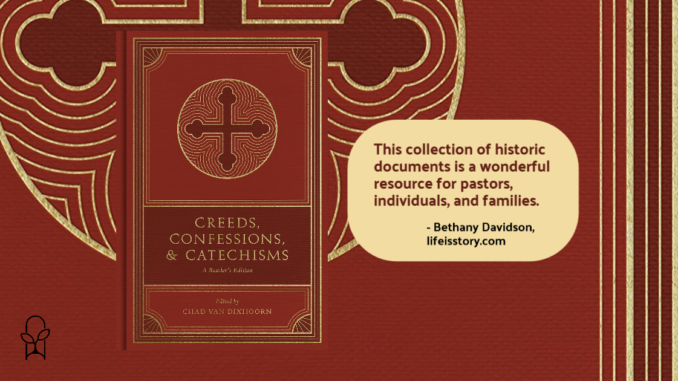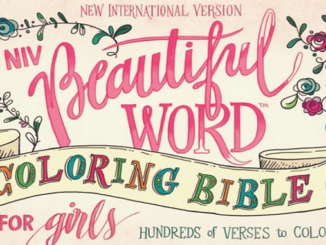
Published by Crossway on June 21, 2022
Genres: Academic, Non-Fiction, Christian Life, Theology
Buy on Amazon
Goodreads

Understand Foundations of the Christian Church through These Historic Statements of Faith
For centuries, followers of Jesus have used creeds and confessions to express their Christian beliefs. Summarizing key truths from Scripture into succinct statements, these words have shaped the church for generations and continue to teach and inspire believers today.Creeds, Confessions, and Catechisms gathers 13 historic statements of faith--including the Apostles' Creed, the Belgic Confession, and the Heidelberg Catechism--into one beautiful collection. Each text includes an introduction from editor Chad Van Dixhoorn that explains its origins and significance to the early church. By learning and revisiting these timeless confessions of faith, readers can grow spiritually and learn more about Christian history.
Great Resource for Daily Reading and Study: Includes early church creeds and major Protestant statements, historical context from editor Chad Van Dixhoorn, and a Scripture index
Accessible: Useful for pastors and laypeople, seminary students, church groups, or anyone seeking to learn about the foundations of Christianity
13 Christian Creeds and Confessions: Includes The Apostles' Creed, The Nicene Creed, The Athanasian Creed, The Chalcedonian Definition, The Augsburg Confession, The Belgic Confession, The Thirty-Nine Articles of Religion, The Canons of Dort, The Westminster Confession of Faith, The London Baptist Confession, The Heidelberg Catechism, The Westminster Larger Catechism, and The Westminster Shorter Catechism
Beautiful Layout: Features a premium cloth-over-board cover with elegant foil stamping, Smyth-sewn binding, and a 2-color interior on premium, cream-colored paper
Adapted from the ESV Bible with Creeds and Confessions
This beautifully bound book collects historic ecumenical and Reformed documents that articulate the Christian faith. Before each one, Chad Van Dixhoorn shares a brief introduction, explaining the document’s origins, historical context, and significance throughout time. The documents involve creeds, confessions, clarifications of post-Reformation theology and practice, and catechisms. Some of the documents are very academic in nature and require a great deal of concentration, but others are simple and direct enough for parents to use with or modify for children. Creeds, Confessions, and Catechisms collects them together for reference, and I enjoyed reading them in consecutive order, contrasting different documents’ strengths and varying areas of focus.
I appreciated common themes in the documents, such as a high view of Christ’s sufficiency for salvation, the authority of Scripture, and the importance of pursuing right doctrine to know and love God. People who have mainly experienced theology as the realm of conceited debate may find this book helpful and refreshing, and Christians who struggle with doubt will appreciate the authors’ concern for anxious Christians who struggle to feel assured in their faith. I appreciated the priority that the document writers placed on comforting weary souls, and would also recommend this to people who are deconstructing cultural elements of their faith and would benefit from a rundown of what teaching is historic and Bible-based, versus an expression of their childhood church’s brand of evangelicalism. On that note, most of the documents include detailed Bible reference notes to identify the source of different assertions.
Creeds, Confessions, and Catechisms: A Reader’s Edition is a wonderful resource for pastors, other ministry leaders, individuals, and families. It is useful as a book to read through and as a reference guide for when different questions and topics arise. My only critiques are that it would have been helpful for the book to include more information about the selection process for the documents, and could have also shared information about translation processes for some of them. I am also curious who updated some of the English documents and when, since the language was less archaic than some quotations I have seen in the past. However, even though I would have liked some additional information, I am very impressed with the book and definitely recommend it.



